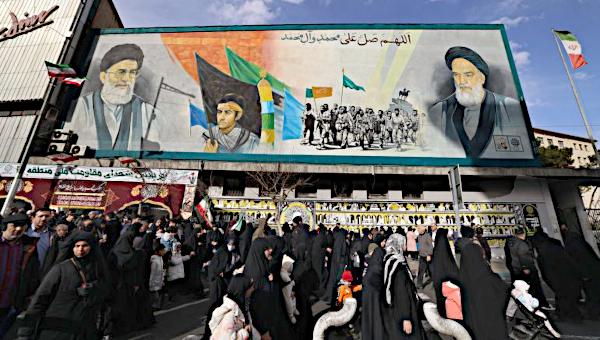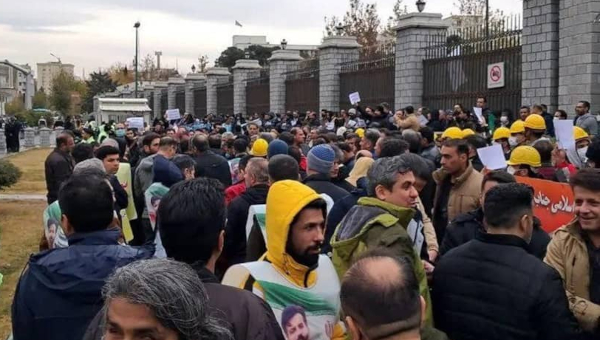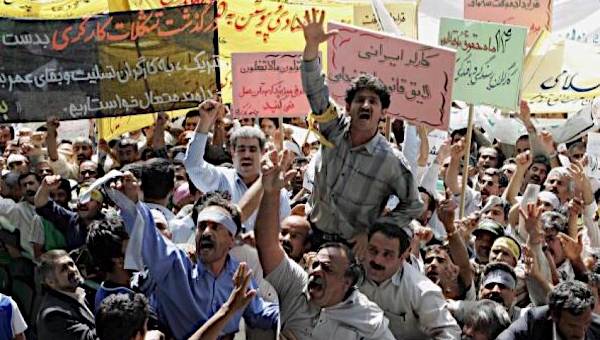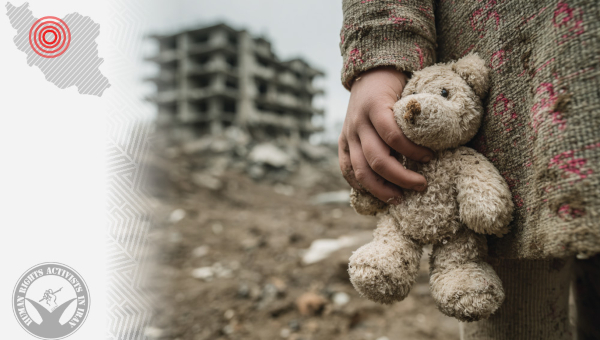The Regressive Politics of the Iranian-Canadian Khavari Petition
On October 12, members of the Iranian-Canadian community sent a petition to Citizenship and Immigration Minister Jason Kenney expressing concern about the arrival in Canada of Mahmoud Reza Khavari, the former chairman of the largest Iranian state-owned banking institution (Bank Melli).
 The evidence available from Iran suggests that Khavari probably used his position to accumulate private wealth at the expense of ordinary Iranians. It is very possible that some of this wealth was illegally acquired. It is also very possible that ill-gotten wealth helped facilitate Khavari’s acquisition of Canadian citizenship, given the way the Canadian immigration system operates.
The evidence available from Iran suggests that Khavari probably used his position to accumulate private wealth at the expense of ordinary Iranians. It is very possible that some of this wealth was illegally acquired. It is also very possible that ill-gotten wealth helped facilitate Khavari’s acquisition of Canadian citizenship, given the way the Canadian immigration system operates.
Unfortunately, the Khavari petition endorses the use of tools by the Canadian government (specifically the revocation of citizenship) that are politically regressive and harmful to the interests of the same people who Khavari allegedly harmed: namely, ordinary Iranians, poor and working people.
The Petition and Regressive Implications
A broad cross-section of members of the Iranian-Canadian community lent their names to the petition. Writing as concerned Canadian citizens, the signatories include a wide range of progressive and critical Iranian professors and academics, along with other human rights-oriented Iranian politicians, writers, public figures and community representatives in Canada.
While we share the desire of the petition’s authors that financial criminals be brought to justice, we argue below that the politics of the petition have several regressive implications.
Skeptical of Khavari’s compliance with the residency requirements necessary to acquire Canadian citizenship, the petition demands that Kenney “utilize legislation introduced in 2010 to streamline the citizenship revocation process to better protect the values of Canadian citizenship.” The petition calls on Kenney to initiate a revocation process through Bill C-37 if investigations show that Khavari “made a false representation, committed fraud or concealed material circumstances to acquire Canadian citizenship.”
There is a spectrum of views on immigration to Canada, including by immigrants. These range from the view that national borders are fundamentally illegitimate, to a liberal, multicultural view on welcoming newcomers, to what might be called the securitized discourse that presents Canada as a besieged country that needs to be protected from wrongdoers all over the world. This securitized discourse, which has been used to refuse, deport, and marginalize immigrants, is adopted by the current Canadian government, its Immigration Minister, and, unfortunately, also by the Khavari petition.
Progressives in any community need to understand that signing a petition steeped in this sort of securitized language can have some very un-progressive implications.
Background on the Case of Khavari
The recent publication about a fraud scandal in Iran has revealed that at least $2.6-billion in credit was obtained from two state banks for the purchase of assets that included state-owned companies and industries. Though suspected to have started in 2007, the fraudulent activities were reported to have intensified during the past few months, and in early September 2011 the CEO of Bank Saderat, another major state-owned financial institution, publicized the discovery of irregularities. At this time it was also announced that accusations of fraudulent activities had, for over a month, been brought to the attention of Iranian judicial and security officials. Iranian business magnate Amir-Mansour Aria, whose empire includes over thirty-five companies, has reportedly been accused of masterminding the scam.
Further, an extensive Iranian parliamentary report has revealed that Economy Minister Shamsoddin Hosseini, along with his deputies and the managers of the Iranian state-owned banks involved in fraudulent activities, were also complicit insofar as they had knowledge of the scheme, yet failed to take action. Described by numerous observers as the country’s largest-ever case of embezzlement, Hosseini, and even Iran’s acting President Mahmoud Ahmadinejad, were considered for questioning by the Iranian Parliament. While there is some disagreement as to how much this scandal has actually damaged Ahmadinejad politically, most observers agree that one fallout from this has been that his projected successor and top aide, Esfandiar Rahim Mashaei, has been effectively blacklisted from succeeding Ahmadinejad in the 2013 presidential elections.
On September 28, amid this fraud scandal, Khavari officially resigned from his post as chair of Bank Melli in a letter to Hosseini, and pled to Ayatollah Ali Khamenei and the people of Iran to pardon him for the bank’s involvement in the scandal. A dual Iranian-Canadian citizen since 2005, Khavari left Iran for Canada, where his family owns a $660,000 home in North York, and a $3-million home in Toronto purchased in 2007, and transferred last month to his daughter’s name. Since his departure, Iranian state prosecutors have declared their willingness to consider requesting an international warrant for Khavari’s arrest should he fail to return for questioning. All in all, this financial scandal has taken social, political, legal and electoral dimensions that will likely dominate the Iranian political scene for the next few weeks, and even months.
The domestic economic context of this scandal is also important. The three-decade economic trajectory of the Islamic Republic reveals an autocratic clerical state system with a sharp neoliberal economic orientation, with the usual privatizations, cuts to the public sector, and deregulation. This neoliberal economic trend has severely intensified since the launch of Ahmadinejad’s 2005 administration, with a crushing effect on issue-based movements, particularly the Iranian workers’ movement. While an anti-corruption platform challenging a segment of the country’s political and economic elite was also adopted by Iranian governments prior to 2005, the difference now is that Ahmadinejad has politically and economically mobilized the security establishment during his presidency. The interplay between neoliberal market reforms and an increasing role played by the Revolutionary Guards has resulted in ranking members of the armed forces repeatedly acquiring civil positions within the state. This militarization of economic and civil activities has situated much control over capital accumulation and distribution in the hands of the Revolutionary Guards and its subsidiaries, rather than the private sector.
The security establishment, a key backer of the Ahmadinejad administration, has been the main economic benefactor of his extensive privatization campaigns. On the other hand, average lower- and middle-class Iranians get rising inflation, high unemployment, international sanctions, and a debilitated economy.
The Khavari Petition
As indicated above, there is good evidence that Khavari is implicated in the use of state power to accumulate private wealth at the expense of ordinary Iranians. Some of this accumulation may have taken place outside the framework of the law, itself written for the benefit of the security establishment and the wealthy. Even in this context, however, the Khavari petition has several political implications from which Iranian-Canadian progressives might want to distance themselves.
First, the petition reproduces some very non-internationalist Canadian myths. Praising what they call Kenney’s “apt” statements about the need to ensure that citizens maintain “an ongoing commitment, connection and loyalty to Canada,” the signatories ask for the implementation of Bill C-37 to revoke Khavari’s citizenship.
The unfortunate truth is that, now that he is in Canada, the question of justice for Khavari is complex. Is the Canadian justice system adequate to try him for financial crimes committed against Iranians? Probably not. Would Khavari be brought to justice in Iran? Probably not. Does he constitute a danger to Canadians? Probably not. But if Khavari is a citizen, however he got it, the more critical question is whether progressives want Canada to be able to revoke citizenship, under any circumstances.
Since the revocation process was formed in 1977, over sixty people have had their citizenship retracted. Placed beside the reintroduction of Bill C-49 which, while advertized as a response to human smuggling, targets refugees for mandatory imprisonment and deportation, and places draconian controls on refugees even after they have been deemed to be legitimately fleeing persecution, Bill C-37 is part of a broader anti-immigrant agenda. It fortifies the residence requirement for citizenship, streamlines the revocation and removal process and limits citizenship by descent to individuals born in the first generation outside Canada. By Kenney’s own admission, the “clear objective” of Bill C-37 is to “preserve the value of citizenship by ensuring it could not be passed on endlessly to generations of Canadians living outside of Canada.” That the petition actually empowers Kenney to revoke citizenship not only reinforces the myth of the Canadian immigration system as generous and permissive, but also contributes to the existing discourse criminalizing migration.
Second, the expression of belief in the generosity of the Canadian immigration system prevents the signatories from using the Khavari case to focus on the hypocrisy of the Canadian government, and the ‘for-sale’ nature of its citizenship. Khavari’s residence in Canada as a citizen is a glaring example of the federal government’s long-standing preference for economic migrants over asylum seekers. If you have enough money, you are welcome to Canada regardless of the official discourse of hostility toward the Islamic Republic. In fact, Kenney has repeatedly emphasized that the Canadian immigration system needs to reflect the country’s economic needs. “Canada’s post-recession economy demands a high level of economic immigration to keep our economy strong,” he said in February 2011 and, since then, has implemented measures to scale back family-class immigration to restrict those with “lower labour-market participation and much higher levels of utilization of the public health system.” This move followed the federal government’s announcement in December 2010 that it was cutting $53-million in funding from settlement, employment, language and cultural agencies that help new immigrants in their move to Canada. Some of these funding cuts were politically targeted against organizations for their progressive politics, for example the Canadian Arab Federation, who might be a natural ally to Iranian-Canadian progressives whose organizations could be next, should they take progressive positions that the current Conservative government does not like.
Only in passing does the petition point to an inconsistency in Canadian immigration policy, but even in doing so it only focuses on Iranians visiting or transferring money to Canada. To advocate on behalf of the vast numbers of disenfranchized Iranians the signatories should instead have emphasized that the Canadian government’s focus on economic immigrants comes at the expense of other kinds of migrants, certainly from Iran but also from other countries, including refugees, asylum seekers and overseas family members. Today, it appears easier for wealthy Iranian officials, supporters and beneficiaries of the brutal hand of the Islamic Republic, to enter Canada than it does for those Iranian dissenters, activists, thinkers, and artists who are critical of the regime. The petition fails to raise its voice against the fact that wealthy business-minded elites such as Khavari are ideal candidates for the Canadian immigration system. Instead, the same system whose integrity is affirmed by the petition, offers a brick wall to countless Iranian dissidents to whom entrance into Canada will be denied – because they will fail to qualify as economic immigrants.
Finally, the petition ignores the fact that the current Canadian government is part of a foreign policy tendency to demonize Iran, which could culminate in policies disastrous for average Iranians. The signers of the petition seem to have assimilated their voices into the dominant ‘war on terror’ discourse. This is evidenced by this week’s statement in Parliament of Manitoba MP James Bezan. In imploring “the government to pursue all legal grounds to revoke Khavari’s reported citizenship,” Bezan repeatedly stressed that Iran “supports terrorism, defiantly pursues nuclear weapons, [and] calls for the end of the state of Israel.” Likely a result of the ‘war on terror’ discourse of the petition, the repression of the Iranian people appears, at best, to be a secondary point of concern for Bezan. The ‘war on terror’ led to the invasions of Iraq and Afghanistan and the deaths of hundreds of thousands of people. The discourse was, and is, also used by repressive governments like Iran all over the world in violating human rights and attacking dissidents. It is a discourse that progressives should be repulsed by, not endorse.
Solidarity with Iranians resisting the repression of the Islamic Republic of Iran must include a sober reading of Canadian government policies and interests. The unfortunate effect of the absence of such a reading is that the Khavari petition has become just another public relations mouthpiece for Canada’s increasingly restrictive immigration policies. In their proposal to enforce restrictive Canadian immigration laws these signatories have failed the real victims: Not only countless Iranian dissidents, but also thousands of non-Iranians currently living in a legal limbo as their cases are funnelled through an immigration system designed to exclude them.
As chairman of Bank Melli, Khavari helped maintain the largest financial institution owned and operated by a state with an ongoing brutal record of repression. A campaign that exposes the hypocrisy of a government that demonizes a regime but allows in wealthy officials with dubious records connected to it, is one thing. But a campaign that uses that demonization, thinking that it can control the consequences, is politically highly mistaken. •





